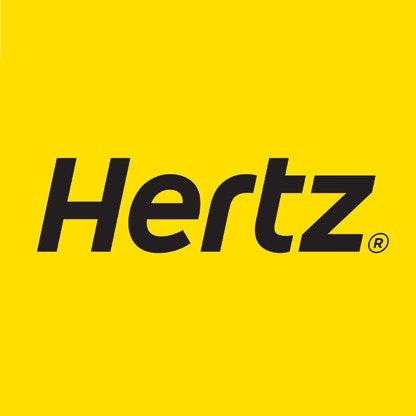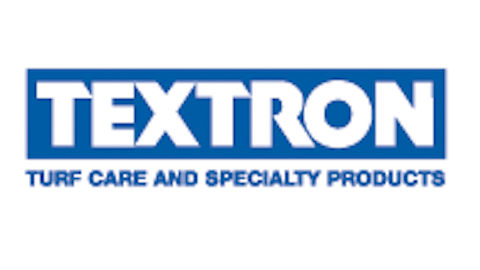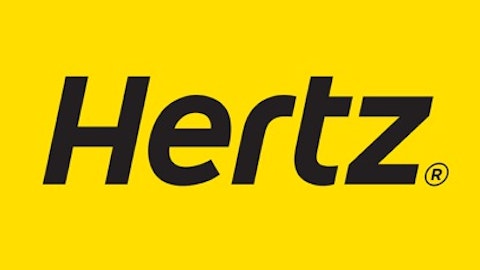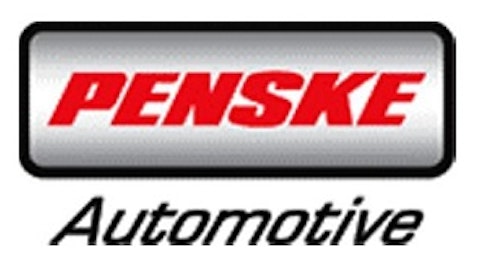What I like about the rental business is that there aren’t a lot of competitors. In the car rental space, you have Hertz Global Holdings, Inc. (NYSE:HTZ), Avis Budget Group Inc. (NASDAQ:CAR), and privately-held Enterprise. In the past decade, the number of competitors has gone from six to three as the industry consolidated. These three companies now control 90% of the market and that gives them tremendous pricing power. Prices for car rentals are now rising, with rentals from Hertz rising 5.3% at airports. As car rental prices increase, that drives the top and bottom lines for the car rental companies.
The rental giant
Hertz Global Holdings, Inc. (NYSE:HTZ) is the rental industry’s largest publicly-traded company. The company’s primary car rental locations are at or near airports in approximately 150 countries. Hertz also has a growing equipment rental business with approximately 340 locations in the U.S., Canada, China, France, Spain and Saudi Arabia. Hertz rents all types of heavy and light equipment for various industries.
The first quarter of this year was a great one for Hertz Global Holdings, Inc. (NYSE:HTZ). Worldwide revenues were up 24.3% in the first quarter. The North American equipment rental business increased 20%. The company’s earnings before interest, taxes, depreciation, and amortization (EBITDA) increased 74.2% year-over-year. Pretax income was $144.5 million compared to $29 million in the prior year’s quarter.
Going forward, Hertz Global Holdings, Inc. (NYSE:HTZ) is targeting Enterprise’s off-airport business. Enterprise’s locations are primarily in neighborhoods and rental times are typically longer. Hertz has about 2,600 neighborhood locations now, compared to about 5,500 locations for Enterprise. Hertz Global Holdings, Inc. (NYSE:HTZ) plans to add 300 neighborhood locations annually and also plans to target the insurance-replacement market. This is a key area for competitor Enterprise, where the insurance company pays the cost of the rental while a car is being repaired.
The rising competitor
Avis Budget Group Inc. (NASDAQ:CAR) rents cars under the “Avis” and “Budget” brands. The company also operates local and one-way truck rentals under its Budget brand with approximately 27,000 trucks.
In the first quarter of this year, revenue increased 4% to $1.7 billion. This was the eleventh consecutive quarter of year-over-year revenue growth. In North America, Avis Budget Group Inc. (NASDAQ:CAR) raised prices 4%. Off-airport business grew 7%, and this is a segment that Avis wants to target. Europe remained weak for the company and as a result its EBITDA declined to $93 million.
Going forward, the growth for Avis will come from its just completed acquisition of Zipcar, the world’s leading car share network. Zipcar has 792,000 members, an increase of 12% from last year. Avis has been actively integrating Zipcar into its Avis network and expects $50 million to $70 million in synergies within two years. The plan is to expand Zipcar globally under the Avis and Budget framework. Avis is expanding Zipcar to more airports and will have equipped 1,000 cars from the Avis and Budget fleets with Zipcar’s technology by the end of this summer.
The leading equipment rental company
United Rentals, Inc. (NYSE:URI) is the largest rental equipment company in the world. The company has over 830 rental locations in the U.S. and Canada. United Rentals has 13% of the North American market for construction and industrial equipment rentals.
In the first quarter of this year, the company generated EBITDA of $451 million. This was a record for the company and was done in the slowest seasonal quarter. Rental rates increased 5.4% year-over-year. This rental rate increase resulted in an EBITDA increase of $40 million.
Last year, United Rentals, Inc. (NYSE:URI) acquired RSC Rentals and is still integrating the acquisition and expects further cost savings going forward. The company will also benefit from a pickup in demand from the housing and construction recovery. Where I see the real growth for the company, though, is in its sales force. Currently 38% of United Rentals’ business is unassigned accounts. These are typically local contractors that come in and rent when they need something. Right now there isn’t a salesperson assigned to those accounts to offer more services from United Rentals. The company has approximately 1,200 outside sales reps in the field and plans to increase that number by 10% in the next year. By catering to this 38% base, United Rentals can increase revenues and profits.
Foolish assessment
The old adage is “why buy when you can rent.” With these companies, they have perfected that business model and have built solid franchises. All three companies have been stellar performers in the past year and I see them continuing to perform well with the economic recovery.
Mark Yagalla has no position in any stocks mentioned. The Motley Fool owns shares of Hertz Global Holdings, Inc. (NYSE:HTZ). Mark is a member of The Motley Fool Blog Network — entries represent the personal opinion of the blogger and are not formally edited.
The article The Rental Business Beats Owning originally appeared on Fool.com and is written by Mark Yagalla.
Copyright © 1995 – 2013 The Motley Fool, LLC. All rights reserved. The Motley Fool has a disclosure policy.






